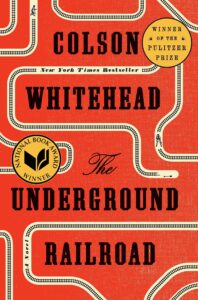Slavery Through the Lens of a Modern Day Author
In Colson Whitehead’s novel, The Underground Railroad (2016), he pairs a realistic illustration of American slavery in the 19th century with an fantastical interpretation of the underground railroad. He explains the underground as a literal train that transported slaves across state lines to achieve freedom. The main character is a young slave named Cora, who is hesitant to escape at first but eventually decides to embark on a dangerous trek to freedom. Chapter I focuses on Cora’s grandmother, Ajarry, who was kidnapped off the coast of Ouidah (present-day Benin) and sold into slavery.
Whitehead explains that Ajarry was sold as part of a bulk purchase for nothing more than cowrie shells and glass beads. Then, the “eighty-eight human souls” with whom she was packaged, were sold for crates of rum and gunpowder. The currency slave traders accepted coveys that slaves were thought of as exchangeable goods; pieces of property. Whitehead describes slave holders walking down rows of slaves, looking at the “merchandise’s eyes and joints and spines.” This terminology is particularly powerful in showing the sheer indifference slave traders had over African lives. Whitehead describes how slaves stood naked on a platform during auctions, where bidding wars ensued. At one point, the author makes a powerful comparison between Ajarry and her buyer, the former who stood naked and ashamed while the latter, cloaked in white garments and shiny rings, grabbed her breasts.
Another gripping section of the opening chapter concerns a slave’s view of death. First, Ajarry is confronted with death when she was on a ship. There, she thought about killing herself as her only chance of freedom. Whitehead describes her as being chained from head to toe in “exponential misery.” Later in her journey, Ajarry was surrounded by death once again as she watches each of her husbands and children die from disease and abuse. At one point, a woman comforts Ajarry by saying, “At least they weren’t sold off.” This quote is eerily telling, suggesting that to the enslaved, the fear of separation and the unknown fate of their family members might have been even worse than certain death.
Excerpt by Colson Whitehead’s The Underground Railroad, read by Jordyn Ney
Music by: Nick Rickert


